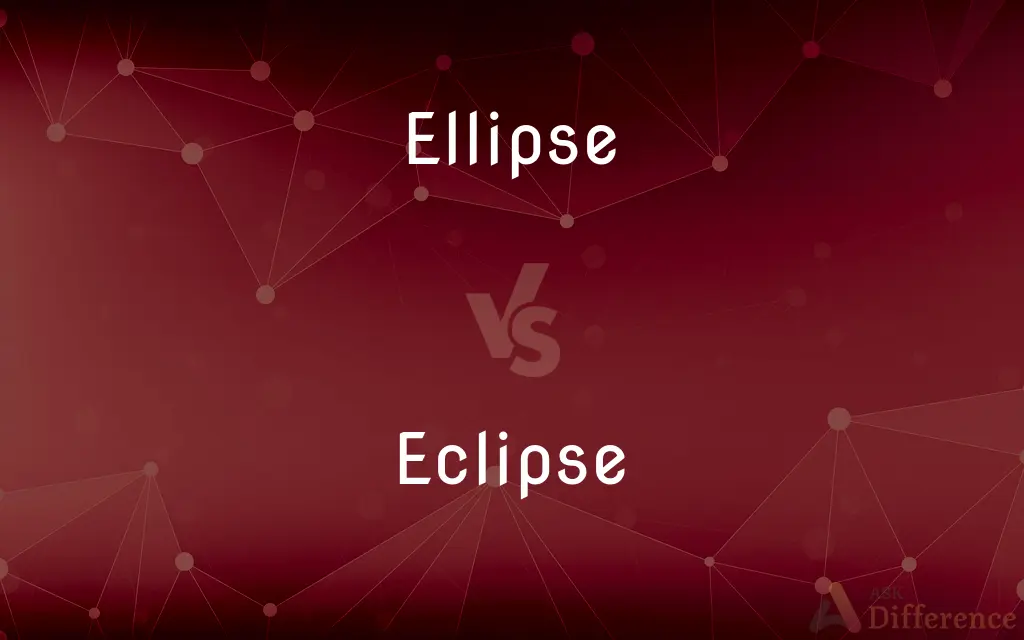Ellipse vs. Eclipse — What's the Difference?
By Tayyaba Rehman & Urooj Arif — Updated on April 9, 2024
An ellipse is a geometric shape representing an oval, defined by two focal points, while an eclipse occurs when one celestial body moves into the shadow of another, obscuring it partially or completely.

Difference Between Ellipse and Eclipse
Table of Contents
ADVERTISEMENT
Key Differences
An ellipse, in geometry, is a curve on a plane surrounding two focal points such that the sum of the distances to the two focal points is constant for every point on the curve. This shape is often seen in the orbits of planets and satellites, which follow elliptical paths around their primaries due to gravitational forces. On the other hand, an eclipse refers to an astronomical event that occurs when one object in space moves into the shadow of another. The most common types are solar and lunar eclipses, where the Earth, Moon, and Sun align in such a way that one of them is partially or fully obscured.
While an ellipse is a fundamental concept in mathematics and physics, illustrating the properties of conic sections and orbital mechanics, an eclipse is more of a natural phenomenon observed from Earth or space, showcasing the interplay of light and celestial mechanics. Ellipses can be drawn and studied as two-dimensional figures, whereas eclipses are dynamic events that depend on the relative positions and movements of celestial bodies.
The creation of an ellipse can be achieved through simple tools like string and pins or mathematical equations, highlighting its presence in both theoretical and applied mathematics. Conversely, predicting an eclipse involves understanding the complex motions of Earth and celestial bodies, requiring advanced astronomical models and observations. This distinction underlines the ellipse's role in explaining the principles of motion and the eclipse's contribution to our understanding of celestial dynamics.
Both concepts, though different in nature, intersect in the study of celestial mechanics. The elliptical orbits of bodies in the solar system lead to the predictable occurrence of eclipses, linking the geometry of ellipses with the timing and positioning of these spectacular astronomical events. However, the primary difference lies in their essence: an ellipse as a shape and mathematical concept, and an eclipse as a specific, observable event within the cosmos.
Comparison Chart
Nature
Geometric shape.
Astronomical event.
ADVERTISEMENT
Definition
A curve on a plane that surrounds two focal points.
The obscuring of one celestial body by another.
Occurrence
In geometry and orbital mechanics.
In astronomy, when celestial bodies align.
Representation
Can be represented mathematically and drawn.
Observed in the sky; cannot be drawn but predicted.
Relevance
Fundamental in understanding orbits and conic sections.
Important for studying celestial mechanics and light.
Examples
Planetary orbits, lenses.
Solar and lunar eclipses.
Study
Mathematics and physics.
Astronomy and astrophysics.
Compare with Definitions
Ellipse
A geometric figure resembling an elongated circle with two focal points.
The planets move in elliptical orbits around the sun.
Eclipse
Results from the precise alignment of the Earth, moon, and sun.
Ancient civilizations could predict eclipses with remarkable accuracy.
Ellipse
Appears in nature and human-made structures, symbolizing balance and efficiency.
The orbits of satellites around the Earth are often elliptical.
Eclipse
A celestial event where one body is obscured by another or its shadow.
A solar eclipse occurs when the moon passes between the Earth and the sun.
Ellipse
Fundamental in optics and planetary science, illustrating light paths and orbits.
The shape of a lens is designed based on the principles of an ellipse.
Eclipse
Observed from Earth, it can be partial, total, or annular.
During a total lunar eclipse, the moon appears red.
Ellipse
A closed curve where the sum of the distances from any point on the curve to two focal points is constant.
An ellipse can be drawn using a string pinned at two focuses.
Eclipse
Can influence animal behavior and environmental conditions temporarily.
Some birds may become quiet or act as if it's nighttime during a solar eclipse.
Ellipse
In mathematics, an ellipse is a plane curve surrounding two focal points, such that for all points on the curve, the sum of the two distances to the focal points is a constant. As such, it generalizes a circle, which is the special type of ellipse in which the two focal points are the same.
Eclipse
Offers insights into the workings of the solar system and universe.
Eclipses have been used to study the sun’s corona.
Ellipse
A conic section whose plane is not parallel to the axis, base, or generatrix of the intersected cone.
Eclipse
An eclipse is an astronomical event that occurs when an astronomical object or spacecraft is temporarily obscured, by passing into the shadow of another body or by having another body pass between it and the viewer. This alignment of three celestial objects is known as a syzygy.
Ellipse
The locus of points for which the sum of the distances from each point to two fixed points is equal.
Eclipse
An obscuring of the light from one celestial body by the passage of another between it and the observer or between it and its source of illumination
An eclipse of the sun
Ellipse
Ellipsis.
Eclipse
A phase during which the distinctive markings of a bird (especially a male duck) are obscured by moulting of the breeding plumage
Eclipse plumage
Ellipse
(geometry) A closed curve, the locus of a point such that the sum of the distances from that point to two other fixed points (called the foci of the ellipse) is constant; equivalently, the conic section that is the intersection of a cone with a plane that does not intersect the base of the cone. Category:en:Curves
Eclipse
(of a celestial body) obscure the light from or to (another celestial body)
Jupiter was eclipsed by the Moon
Ellipse
(grammar) To remove from a phrase a word which is grammatically needed, but which is clearly understood without having to be stated.
In B's response to A's question:- (A: Would you like to go out?, B: I'd love to), the words that are ellipsed are go out.
Eclipse
The partial or complete obscuring, relative to a designated observer, of one celestial body by another.
Ellipse
An oval or oblong figure, bounded by a regular curve, which corresponds to an oblique projection of a circle, or an oblique section of a cone through its opposite sides. The greatest diameter of the ellipse is the major axis, and the least diameter is the minor axis. See Conic section, under Conic, and cf. Focus.
Eclipse
The period of time during which such an obscuration occurs.
Ellipse
Omission. See Ellipsis.
Eclipse
A temporary or permanent dimming or cutting off of light.
Ellipse
The elliptical orbit of a planet.
The Sun flies forward to his brother Sun;The dark Earth follows wheeled in her ellipse.
Eclipse
A fall into obscurity or disuse; a decline:"A composer ... often goes into eclipse after his death and never regains popularity"(Time).
Ellipse
A closed plane curve resulting from the intersection of a circular cone and a plane cutting completely through it;
The sums of the distances from the foci to any point on an ellipse is constant
Eclipse
A disgraceful or humiliating end; a downfall:Revelations of wrongdoing helped bring about the eclipse of the governor's career.
Eclipse
To cause an eclipse of.
Eclipse
To obscure; darken.
Eclipse
To obscure or diminish in importance, fame, or reputation.
Eclipse
To surpass; outshine:an outstanding performance that eclipsed the previous record.
Eclipse
(astronomy) An alignment of astronomical objects whereby one object comes between the observer (or notional observer) and another object, thus obscuring the latter.
Eclipse
Especially, an alignment whereby a planetary object (for example, the Moon) comes between the Sun and another planetary object (for example, the Earth), resulting in a shadow being cast by the middle planetary object onto the other planetary object.
Eclipse
(ornithology) A seasonal state of plumage in some birds, notably ducks, adopted temporarily after the breeding season and characterised by a dull and scruffy appearance.
Eclipse
Obscurity, decline, downfall.
Eclipse
(transitive) Of astronomical or atmospheric bodies, to cause an eclipse.
The Moon eclipsed the Sun.
Eclipse
To overshadow; to be better or more noticeable than.
Eclipse
(Irish grammar) To undergo eclipsis.
Eclipse
An interception or obscuration of the light of the sun, moon, or other luminous body, by the intervention of some other body, either between it and the eye, or between the luminous body and that illuminated by it. A lunar eclipse is caused by the moon passing through the earth's shadow; a solar eclipse, by the moon coming between the sun and the observer. A satellite is eclipsed by entering the shadow of its primary. The obscuration of a planet or star by the moon or a planet, though of the nature of an eclipse, is called an occultation. The eclipse of a small portion of the sun by Mercury or Venus is called a transit of the planet.
That fatal and perfidious bark,Built in the eclipse, and rigged with curses dark.
Eclipse
The loss, usually temporary or partial, of light, brilliancy, luster, honor, consciousness, etc.; obscuration; gloom; darkness.
All the posterity of our fist parents suffered a perpetual eclipse of spiritual life.
As in the soft and sweet eclipse,When soul meets soul on lovers' lips.
Eclipse
To cause the obscuration of; to darken or hide; - said of a heavenly body; as, the moon eclipses the sun.
Eclipse
To obscure, darken, or extinguish the beauty, luster, honor, etc., of; to sully; to cloud; to throw into the shade by surpassing.
My joy of liberty is half eclipsed.
Eclipse
To suffer an eclipse.
While the laboring moonEclipses at their charms.
Eclipse
One celestial body obscures another
Eclipse
Exceed in importance; outweigh;
This problem overshadows our lives right now
Eclipse
Cause an eclipse of (a celestial body) by intervention;
The Sun eclipses the moon today
Planets and stars often are occulted by other celestial bodies
Eclipse
Cause an eclipse of; of celestial bodies;
The moon eclipsed the sun
Common Curiosities
What is an eclipse?
An eclipse is an astronomical event that occurs when one celestial body moves into the shadow of another, causing the first to become partially or fully obscured.
How do the paths of celestial bodies relate to ellipses?
The orbits of planets and satellites are often elliptical, following the principles outlined by Kepler’s laws of planetary motion.
What is an ellipse?
An ellipse is an oval-shaped curve that surrounds two focal points, with the sum of the distances to these points being constant for any point on the curve.
How are eclipses predicted?
Eclipses are predicted through calculations that account for the orbits of the Earth, moon, and sun, using principles of celestial mechanics.
Can an ellipse occur in nature?
Yes, ellipses occur in nature, such as in planetary orbits and in the shape of some leaves and fruits.
What mathematical properties define an ellipse?
An ellipse is defined by its major and minor axes, which determine its shape and size, and by the positions of its foci, which influence its curvature.
Why don't eclipses happen every month?
Eclipses don’t happen every month due to the tilt of the moon’s orbit relative to the Earth’s orbit around the sun, requiring specific alignments for an eclipse to occur.
What is the significance of a solar eclipse?
Solar eclipses provide unique opportunities for scientific research, such as studying the sun’s corona and solar flares, and have cultural and historical significance.
What role does the ellipse play in technology?
Ellipses play roles in various technologies, including satellite orbits, optics (lenses), and architectural design for sound reflection.
Can eclipses be seen from anywhere on Earth?
The visibility of eclipses is limited to certain areas of the Earth, depending on the type of eclipse and its path of totality or partial visibility.
How did ancient cultures understand eclipses?
Ancient cultures understood eclipses through observation and developed sophisticated methods to predict them, often attributing them to supernatural causes.
Share Your Discovery

Previous Comparison
Catering vs. Hospitality
Next Comparison
Aww vs. AhAuthor Spotlight
Written by
Tayyaba RehmanTayyaba Rehman is a distinguished writer, currently serving as a primary contributor to askdifference.com. As a researcher in semantics and etymology, Tayyaba's passion for the complexity of languages and their distinctions has found a perfect home on the platform. Tayyaba delves into the intricacies of language, distinguishing between commonly confused words and phrases, thereby providing clarity for readers worldwide.
Co-written by
Urooj ArifUrooj is a skilled content writer at Ask Difference, known for her exceptional ability to simplify complex topics into engaging and informative content. With a passion for research and a flair for clear, concise writing, she consistently delivers articles that resonate with our diverse audience.












































